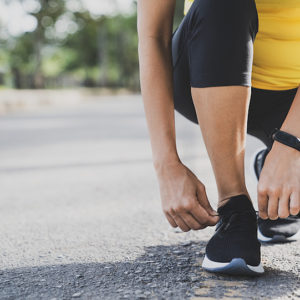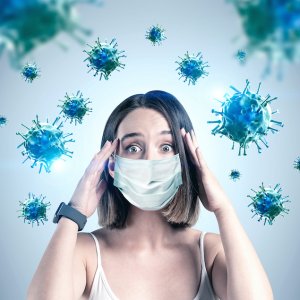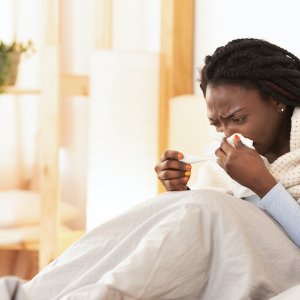For many women, menstrual cycles can be debilitating. From painful cramps and bloating to monstrous cravings and nausea to irritability and weepiness, it’s as if your period runs the show for your body one week each month. These symptoms may leave you wondering why you feel so sick on your period. It’s because sex hormones, like estrogen, progesterone, and testosterone, actually affect the immune system and its function. Your menstrual cycle plays a key role in your immunity and susceptibility to illness.
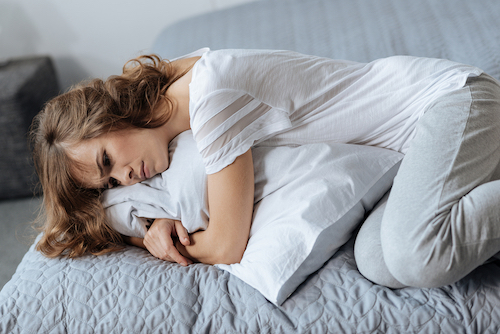
The Relationship Between the Menstrual Cycle and Immune System
Research shows that the menstrual cycle affects immune cell numbers and modulates their activity throughout the 4-week cycle. In fact, systemic diseases, such as autoimmune diseases, asthma, diabetes, cardiac arrhythmia and schizophrenia, display worsening symptoms premenstrually or during menses. This is likely due to physiologic effects on the body mediated by progesterone and estrogen fluctuations.
Furthermore, menstruation is considered an inflammatory event. This is because the gradual decrease of progesterone causes an influx of inflammatory cytokines and leucocytes to the uterine environment. In contrast, as progesterone levels increase, inflammation decreases.
We tend to think of inflammation as a bad thing. It’s important to understand that this is not always the case. Increasing inflammation spurs the immune system into action and is one way our bodies fight off pathogens.
The Follicular Phase
The first part of your cycle, the follicular phase, begins on the first day of your period and lasts until ovulation (around day 13-14 for most women with regular cycles). During this time, estrogen levels rise in preparation for ovulation. Increased estrogen causes an inflammatory response, typically increasing antibodies. So you are likely less susceptible to infection during the follicular phase.
There are exceptions to this theory. Certain people, such as those with autoimmune disorders, experience worsening symptoms with increased inflammation.
The Luteal Phase
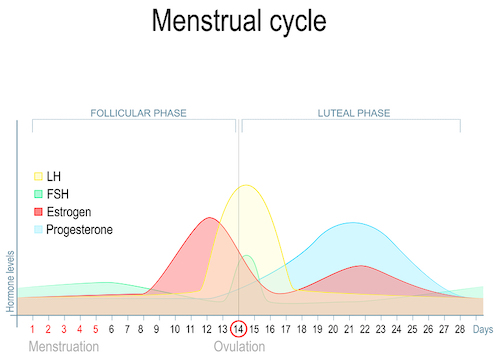
The next part of the menstrual cycle is the period following ovulation and before your period starts (so approximately days 15-28). During this phase, progesterone levels rise. This causes a decrease in the immune system’s inflammatory response. For those with asthma or other inflammatory diseases, this means they will experience fewer symptoms. For individuals without any underlying disorders, the decreased inflammation equals decreased immunity.
Suppressed inflammatory response actually increases a person’s risk of infection, so many women are more likely to get sick during the luteal phase.
But Why?
Interestingly, scientists propose a physiologic reason for the intricate relationship between your menstrual cycle and immunity. Keep in mind that the menstrual cycle functions to prepare your body for pregnancy, and the body’s goal is promote pregnancy.
During the follicular phase, you can’t get pregnant because you haven’t ovulated yet. So your body works to fight off foreign invaders so that you can stay healthy enough to become pregnant.
However, after ovulation, estrogen levels decline and your immune system is down-regulated by increased progesterone. This happens in order to prevent immune cells from attacking a fertilized egg.
The Bottom Line
In a nutshell, your immune system is stronger during the first phase of your cycle, from the time you start your period until ovulation. After ovulation, when most women experience PMS symptoms, immunity decreases and women become more susceptible to infection and illness.
What Can You Do?
Most women feel crummy during the latter part of the luteal phase, as this is when PMS symptoms mount. Understand that your immune system is a bit weaker during this time and be nice to yourself.

Caring for yourself will not only ease PMS, but it may prevent you from getting sick. Make sure you eat properly and resist those urges to binge on chips and ice cream. Do some gentle exercise and drink lots of water to keep the lymphatic system moving. Take a nap if you need one. Check out these Essential Oil Blends for PMS for some premenstrual TLC.
An interesting study also showed that having more sex increases immunity, so a hop in the sack may also help ward off illness.
Have you tried Thinx period underwear? I’m telling you girl, you need to give this a try! Check out this article about the Dangers of Feminine Hygiene Products and learn more about Thinx!


